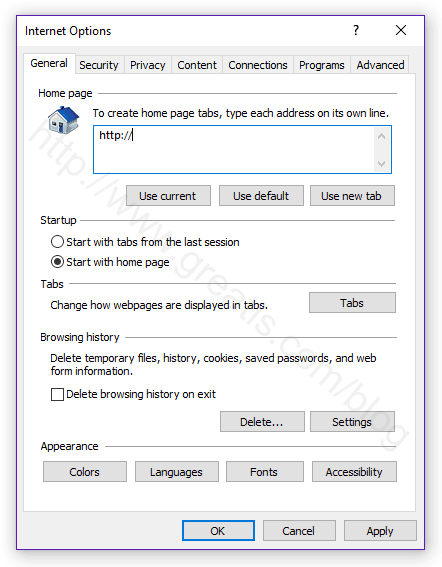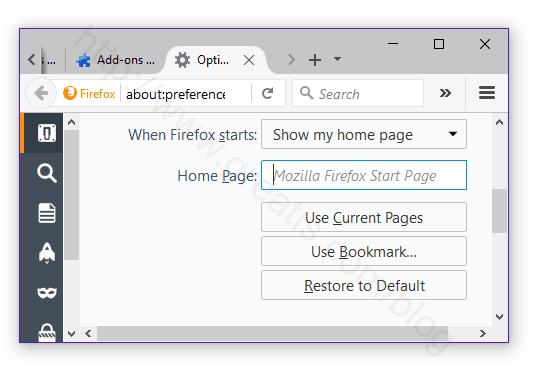 I recommend you UnHackMe - Ultimate Malware Killer for fast malware removal:
I recommend you UnHackMe - Ultimate Malware Killer for fast malware removal:
Free Download Fully Functional 30-day Trial. No credit card is required.
Reviews. EULA. Privacy Policy. Uninstall.
How to remove 185.242.104.131?
185.242.104.131 detected as TROJAN.SQLCRYPT.
185.242.104.131 ads are displayed as large blocks of content and images, intrusive pop-ups, gutter ads, distracting click-bait and suggestive content that is usually unrelated to the content of the Web site you are browsing.
185.242.104.131 ads are injected into all your web browsers, including Internet Explorer, Chrome, Firefox, Safari and Opera.
185.242.104.131 ads can be identified by spotting a small text that is normally located above (top-right) or below (bottom-right) of the ads. The text will normally say "Ads by 185.242.104.131". If 185.242.104.131 ads are served as pop-ups, you can identify them by spotting the URL in the pop-up window.
What types of unwanted behavior do Ads by 185.242.104.131 exhibit?
Ads by 185.242.104.131 are intrusive and invasive, often displaying irrelevant and objectionable content. Sometimes, the user's default home page and/or search provider are substituted with pages serving 185.242.104.131 ads.
Ads by 185.242.104.131 can appear when you open a new tab in the browser. In these cases, sites with 185.242.104.131 ads will replace your default web page displaying when you open the browser, and deliver altered search results when you fire a search in the browser.
Some reports suggest that 185.242.104.131 ads may appear immediately after your computer starts up. If this is the case, the corresponding Web page was injected to autostart with a simple "explorer http://185.242.104.131" command.
185.242.104.131 ads are often added to Web browser shortcuts on your computer's desktop, Start menu and/or the taskbar.
If this is the case, the browser shortcut will contain an altered command line to launch your default Web browser every time you want to open a new browsing session.
185.242.104.131 ads can be launched without altering browser shortcuts by altering Windows Registry to specify a modified path to your default Web browser. This also results in 185.242.104.131 opening every time you launch a new browsing session.
Ads by 185.242.104.131 can be injected into Web pages by installing a signed netfilter driver sniffing your Web traffic and injecting the ads into HTML code of Web pages.
How 185.242.104.131 got on your computer?
Just as malware or potentially unwanted programs, ads by 185.242.104.131 get installed to your computer with browser toolbars, fake extensions and plugins (fake YouTube plugins, fake codec packs and fake "PC Cleaner" and "Windows Accelerator" type of products are among the most common), or simply downloaded with software obtained from suspicious sources.
In order to display 185.242.104.131 ads, some files are copied to your computer, some browser settings and/or registry keys are modified.
A browser toolbar, extension or plugin can be installed into your Web browser. In certain cases, existing browser plugins are infected by substituting manifest files or plugin source code.
Sometimes a new startup key is created to automatically launch 185.242.104.131 ads when your computer boots up. After installation, 185.242.104.131 ads begin showing up as ads, pop-ups, and banners on your computer or in your Web browser.
You have 2 ways to remove 185.242.104.131:
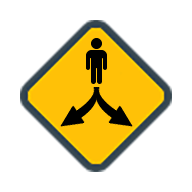
Why I recommend you to use an automatic way?
- You know only one virus name: "185.242.104.131", but usually you have infected by a bunch of viruses.
The UnHackMe program detects this threat and all others. - UnHackMe is quite fast! You need only 5 minutes to check your PC.
- UnHackMe uses the special features to remove hard in removal viruses. If you remove a virus manually, it can prevent deleting using a self-protecting module. If you even delete the virus, it may recreate himself by a stealthy module.
- UnHackMe is small and compatible with any antivirus.
- UnHackMe is fully free for 30-days!
Here’s how to remove 185.242.104.131 virus automatically:
STEP 1: Install UnHackMe (1 minute)
STEP 2: Scan for malware using UnHackMe (1 minute)
STEP 3: Remove 185.242.104.131 virus (3 minutes)
So it was much easier to fix such problem automatically, wasn't it?
That is why I strongly advise you to use UnHackMe for remove 185.242.104.131 redirect or other unwanted software.
How to remove 185.242.104.131 manually:
STEP 1: Check all shortcuts of your browsers on your desktop, taskbar and in the Start menu. Right click on your shortcut and change it's properties.
You can see 185.242.104.131 or another web site at the end of shortcut target (command line). Remove it and save changes.
In addition, check this command line for fake browser's trick.
For example, if a shortcut points to Google Chrome, it must have the path:
C:\Program Files (x86)\Google\Chrome\Application\chrome.exe.
Fake browser may be: …\Appdata\Roaming\HPReyos\ReyosStarter3.exe.
Also the file name may be: “chromium.exe” instead of chrome.exe.
STEP 2: Investigate the list of installed programs and uninstall all unknown recently installed programs.
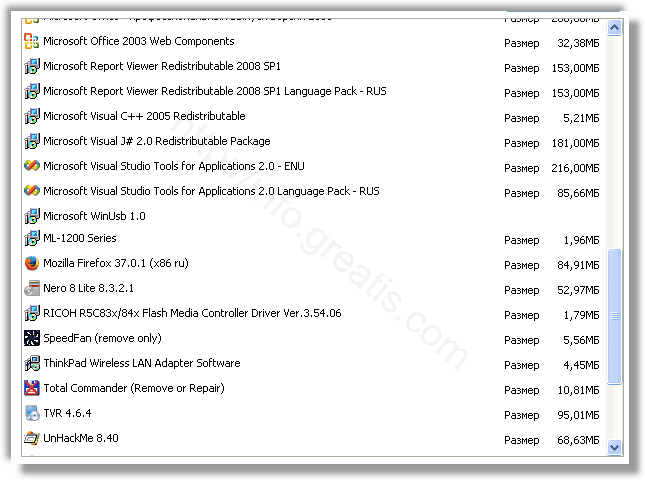
STEP 3: Open Task Manager and close all processes, related to 185.242.104.131 in their description. Discover the directories where such processes start. Search for random or strange file names.
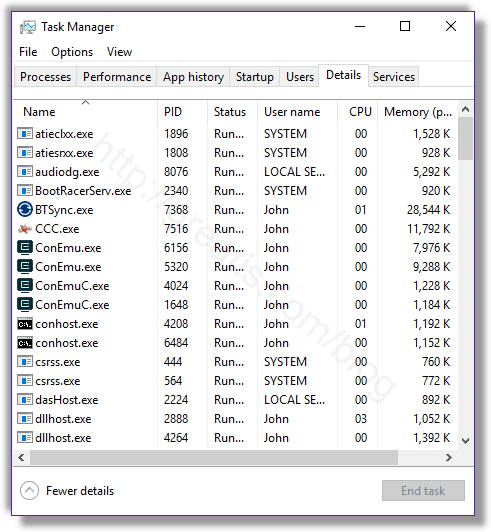
Remove 185.242.104.131 virus from running processes
STEP 4: Inspect the Windows services. Press Win+R, type in: services.msc and press OK.
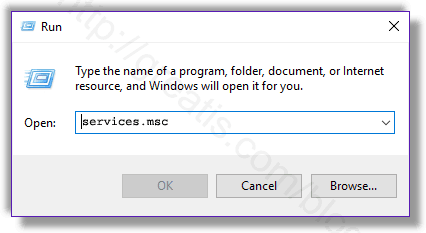
Remove 185.242.104.131 virus from Windows services
Disable the services with random names or contains 185.242.104.131 in it's name or description.
STEP 5: After that press Win+R, type in: taskschd.msc and press OK to open Windows Task Scheduler.
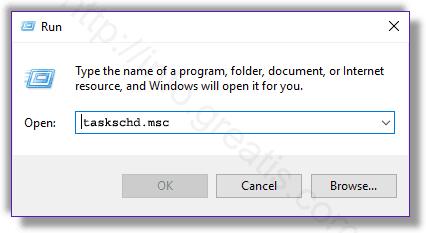
Delete any task related to 185.242.104.131. Disable unknown tasks with random names.
STEP 6: Clear the Windows registry from 185.242.104.131 virus.
Press Win+R, type in: regedit.exe and press OK.
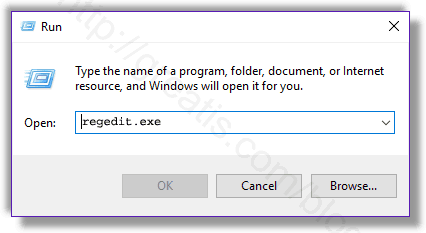
Remove 185.242.104.131 virus from Windows registry
Find and delete all keys/values contains 185.242.104.131.
STEP 7: Remove 185.242.104.131 from Google Chrome.
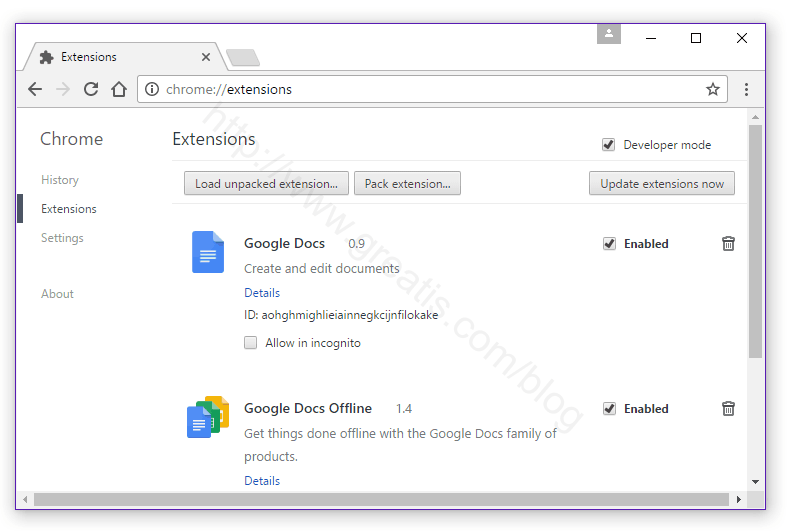
STEP 8: Remove 185.242.104.131 from Internet Explorer.
STEP 9: Remove 185.242.104.131 from Mozilla Firefox.
STEP 10: And at the end, clear your basket, temporal files, browser's cache.
But if you miss any of these steps and only one part of virus remains – it will come back again immediately or after reboot.

